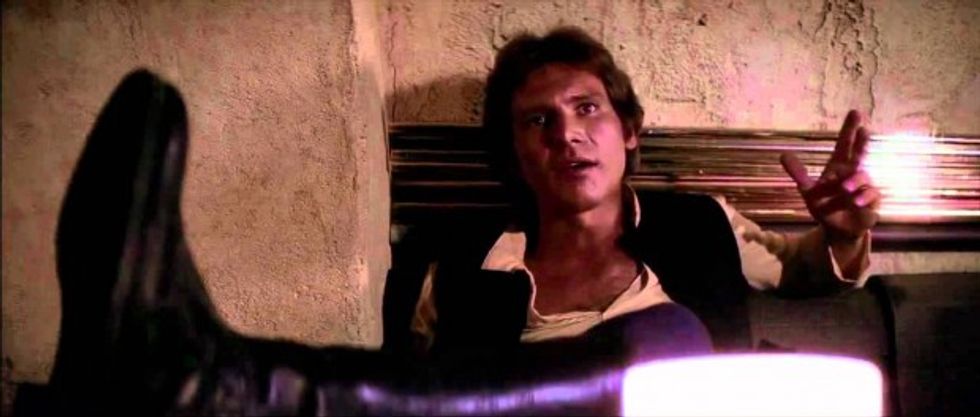
Screengrab

With the newest chapter of the "Star Wars" saga being released this weekend, we thought the time was right to revisit one of the franchise's most prominent controversies: Han shot first.
For those not in the know, the controversy surrounds a change George Lucas made to the first film - Episode IV, ironically - when Han Solo was cornered in a seedy cantina by a bounty hunter named Greedo. In the original version, while Greedo has a blaster leveled at Han and is talking about how much he wants to shoot him, Han sneakily gets his own blaster out under the table and shoots the bounty hunter before his green-skinned adversary could get off a shot.

In 1997, in anticipation for the release of Episode "The Phantom Menace," George Lucas re-released the original films in theaters with all new special effects and some deleted scenes put back in. Lucas dubbed these new cuts "Star Wars: The Special Edition." It was in this "Special Edition" that he also made the change of having Greedo shoot first and miss, and then Han Solo shoot back.
For almost 20 years, this has been a hot button topic for fans. But it really is an important topic, and here's why.
Back in 2012 Bill Whittle looked at this subject - which he called "this geek story" - from a real world point of view. To Whittle, it was a no-brainer that Han shot first. Why wouldn't he shoot first? If someone who wants to kill you has a gun trained right on you, are you going to wait for them to shoot before you feel vindicated in "shooting back?"
To liberals, like George Lucas, that would seem to be the prudent thing. Let the bad guy shoot at you, and then you can shoot back and claim self-defense. If you shoot first, however - regardless of circumstances - you are a murderer. They would certainly have police live by this rule. The problem is, 10 times out of 10 if the bad guy gets the chance to shoot first, the good guy won't have the opportunity to shoot back at all. He will be dead.
Writing for "Vulture," attorney Josh Gilliand even explains step-by-step why Han Solo was perfectly justified under the law - albeit our own human law - for taking the first shot at Greedo.
According to George Lucas, however, Greedo always shot first. The original cut just had a bad camera angle.
"The controversy over who shot first, Greedo or Han Solo, in 'Episode IV,'" Lucas told The Hollywood Reporter, "what I did was try to clean up the confusion, but obviously it upset people because they wanted Solo to be a cold-blooded killer, but he actually isn’t. It had been done in all close-ups and it was confusing about who did what to whom. I put a little wider shot in there that made it clear that Greedo is the one who shot first, but everyone wanted to think that Han shot first, because they wanted to think that he actually just gunned him down."
So to George Lucas, and presumably all of his liberal friends, fans who argue with the change just wanted Han Solo to be a cold-blooded killer. You know what, though? He's correct. Even though, in a real world scenario, Bill Whittle is completely right and the moment that Greedo pulled his gun on Han Solo, Han was justified in killing him in self-defense, the fans do want Han to be a cold-blooded killer.
You see, that gives Han Solo a character arc. It shows how the character changed through the course of the film.
When we first meet Han Solo, it's in a seedy bar, negotiating a price for doing a highly illegal thing. Han Solo is a smuggler; a pirate. Han Solo is not a good person, nor is he a heroic character. He kills another man in cold blood - for the sake of argument - and he spends the rest of the film reminding everyone that he's not doing this for the Rebellion, or any idealistic crusade, he's in it for the money. That's it, he wants his reward and then he's hitting the bricks.
Han Solo does, in fact, get his reward and then leave just as Luke Skywalker and the rebel pilots are going on a dangerous mission to blow up the Death Star. He doesn't care because their mission isn't his.
It's Han Solo, however, at the climax of the film, who returns to help and saves Luke from being blasted out of the metaphorical sky and clears the way for him to destroy the Death Star. While Luke fires the fatal shot, that shot never would have been fired had Han Solo not decided to come back and help his friend.
You see, Han Solo has an arc. He goes from a not-so-nice character in a seedy bar, to a reluctant hero, and finally to the heroic character we remember him as through the course of that film. Forcing Han into the anti-gun left's idea of morality and heroism causes that arc to become much less drastic, less meaningful, and therefore less important to the story.
What George Lucas knew in 1977 and seems to have forgotten - mostly due to his Hollywood liberal programming - is that developing your characters is important. Yes, George, we do want Han Solo to be a cold-blooded killer, but not because we're blood thirsty. It's because we want his character to be important to the story, and for that his arc must remain intact.
–
TheBlaze contributor channel supports an open discourse on a range of views. The opinions expressed in this channel are solely those of each individual author.